In today’s modern world, access to electricity is often taken for granted. However, there are still millions of people living in off-grid communities, deprived of this essential resource. Lack of electricity hampers economic growth, limits educational opportunities, and negatively impacts overall quality of life. Fortunately, advancements in technology have paved the way for innovative solutions to address this issue. Two such solutions that are revolutionizing rural electrification are mini-grids and solar home systems. In this article, we will explore how these technologies are empowering off-grid communities and discuss their potential to transform lives.

Understanding Mini-Grids
What are Mini-Grids?
Mini-grids, also known as micro-grids, are localized power generation and distribution systems that operate independently of the national grid. These systems typically consist of a combination of renewable energy sources, such as solar panels and wind turbines, along with batteries for energy storage. The generated electricity is then distributed to nearby households and businesses, providing them with a reliable and sustainable source of power.
Benefits of Mini-Grids
Mini-grids offer numerous benefits for off-grid communities. Firstly, they provide access to clean and affordable electricity, replacing the need for expensive and polluting fossil fuel-based energy sources. This not only reduces carbon emissions but also improves air quality and promotes environmental sustainability. Additionally, mini-grids allow for the integration of renewable energy sources, reducing dependency on fossil fuels and making communities more resilient to energy price fluctuations.
Mini-grids also foster economic development by enabling productive activities, such as small-scale businesses and agricultural processing. Access to electricity opens up opportunities for income generation, job creation, and improved livelihoods. Moreover, mini-grids can support the establishment of essential services like healthcare centers, schools, and water supply systems, enhancing the overall well-being of the community.
Solar Home Systems: Empowering Individuals
What are Solar Home Systems?
Solar home systems (SHS) are standalone photovoltaic systems designed to provide electricity to individual households. These systems typically consist of solar panels, batteries, and inverters, which convert solar energy into usable electricity. SHS are particularly well-suited for off-grid communities, as they can be easily installed and maintained at the household level, without the need for extensive infrastructure.
Empowering Off-Grid Communities
Solar home systems have the potential to transform the lives of individuals in off-grid communities. By providing clean and reliable electricity, SHS offer numerous benefits. For households, access to electricity means improved lighting, enabling children to study after dark and enhancing overall safety and security. It also allows for the use of electrical appliances, such as fans, refrigerators, and mobile phones, improving living conditions and connectivity.
Furthermore, solar home systems can have a significant impact on health outcomes. With access to electricity, households can power medical devices, such as refrigerators for vaccines and oxygen concentrators, ensuring better healthcare delivery. Additionally, electrification enables the use of clean cooking technologies, reducing indoor air pollution and associated health risks.
The Synergy between Mini-Grids and Solar Home Systems
While both mini-grids and solar home systems have individual merits, the combination of these technologies can further strengthen the electrification efforts in off-grid communities. Mini-grids can act as a central power generation and distribution hub, supplying electricity to the community as a whole. Simultaneously, solar home systems can be utilized at the household level, providing individuals with their own power source.
This synergy allows for a more comprehensive and holistic approach to rural electrification. Mini-grids can cater to the energy needs of businesses, productive activities, and public services, while solar home systems ensure household-level energy access. Together, they create a sustainable and scalable solution that addresses the diverse energy requirements of off-grid communities.
Overcoming Challenges and Driving Adoption
While the potential of mini-grids and solar home systems to revolutionize rural electrification is undeniable, several challenges need to be addressed to ensure widespread adoption.
One of the primary challenges is the initial cost of installation and equipment. Governments, NGOs, and development agencies play a crucial role in providing financial support and incentives to make these technologies more affordable and accessible to off-grid communities. Moreover, capacity building initiatives and awareness campaigns are essential to educate individuals about the benefits and usage of these systems.
Additionally, policies and regulations need to be formulated to support the integration of mini-grids and solar home systems into existing energy frameworks. This involves establishing favorable tariffs, incentivizing private sector participation, and streamlining the approval process for project implementation.
Conclusion
In conclusion, mini-grids and solar home systems have the potential to revolutionize rural electrification and empower off-grid communities. These technologies offer access to clean, affordable, and reliable electricity, fostering economic development, improving livelihoods, and enhancing overall well-being. By leveraging the synergy between mini-grids and solar home systems, a comprehensive and scalable solution can be achieved. However, to ensure widespread adoption, it is crucial to overcome challenges and drive policy support. With concerted efforts from governments, organizations, and communities, we can create a brighter future for off-grid communities, where electricity is no longer a luxury but a basic necessity for empowerment and progress.